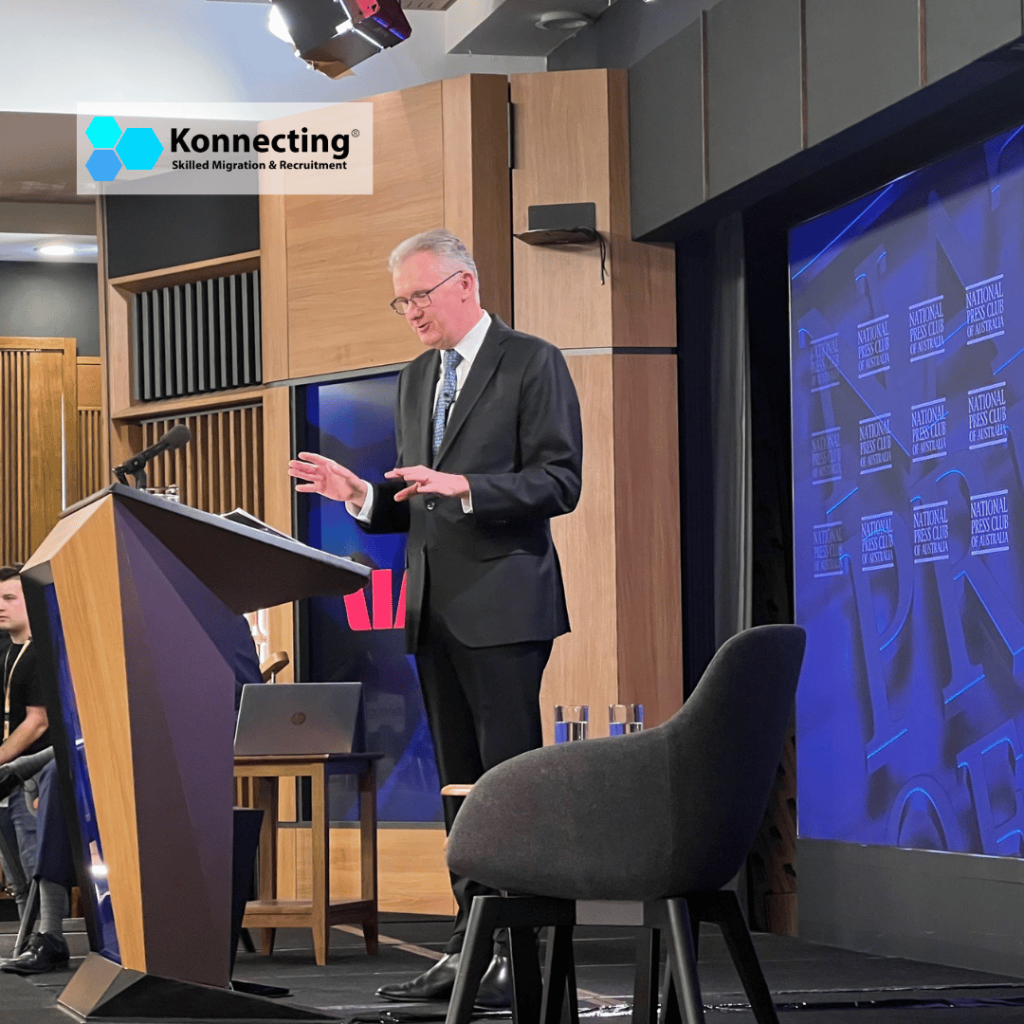Australia to Welcome Skilled Migrants to Boost Economic Recovery
-
Agriculture
-
All Agriculture
Select sub classifications-
Agricultural Technician
-
Fisheries Officer
-
Meat Inspector
-
Quarantine Officer
-
Primary Products Inspector Nec
-
Aquaculture Farmer
-
Cotton Grower
-
Flower Grower
-
Fruit or Nut Grower
-
Grain, Oilseed or Pasture Grower
-
Grape Grower
-
Mixed Crop Farmer
-
Sugar Cane Grower
-
Turf Grower
-
Vegetable Grower
-
Crop Farmers nec
-
Apiarist
-
Beef Cattle Farmer
-
Dairy Cattle Farmer
-
Deer Farmer
-
Goat Farmer
-
Horse Breeder
-
Mixed Livestock Farmer
-
Pig Farmer
-
Poultry Farmer
-
Sheep Farmer
-
Livestock Farmer nec
-
Mixed Crop and Livestock Farmer
-
Hunter Trapper
-
Pest Controller
-
Farm, Forestry and Garden Workers Nec
-
Wine Maker
-
Food Technologist
-
Agricultural Engineer
-
Agriculture Consultant
-
Forester
-
Biomedical Engineer
-
Production Manager (Forestry)
-
Shearer
-
Veterinary Nurse
-
Wool Buyer
-
Florist
-
Gardener (General)
-
Arborist
-
Landscape Gardener
-
Greenkeeper
-
Nurseryperson
-
Dog Trainer or Handler
-
Horse Trainer
-
Pet Groomer
-
Zookeeper
-
Animal Attendants and Trainers (nec)
-
Agricultural and Horticultural Mobile Plant Operator
-
Logging Plant Operator
-
Conservation Officer
-
Environmental Consultant
-
Environmental Research Scientist
-
Park Ranger
-
Environmental Scientists (nec)
-
Automotive Heavy Mechanic (Agricultural)
-
-
Automotive
-
All Automotive
Select sub classifications-
Automotive Electrician
-
Motor Vehicle Parts and Accessories Fitter
-
Motor Vehicle or Caravan Salesperson
-
Panelbeater
-
Motor Vehicle Parts Interpreter
-
Vehicle Body Builder
-
Vehicle Trimmer
-
Vehicle Painter
-
Motor Mechanic (General)
-
Diesel Motor Mechanic
-
Motorcycle Mechanic
-
Small Engine Mechanic
-
Workshop/Service Centre Manager
-
Workshop Manager/Leading Hand
-
Fleet Manager
-
Railway Station Manager
-
Transport Company Manager
-
Others
-
-
Engineering
-
All Engineering
Select sub classifications-
Engineering Manager
-
Chemical Engineer
-
Materials Engineer
-
Civil Engineer
-
Geotechnical Engineer
-
Quantity Surveyor
-
Structural Engineer
-
Transport Engineer
-
Electrical Engineer
-
Electronics Engineer
-
Industrial Engineer
-
Mechanical Engineer
-
Production or Plant Engineer
-
Mining Engineer (excluding Petroleum)
-
Petroleum engineer
-
Aeronautical Engineer
-
Agricultural Engineer
-
Biomedical Engineer
-
Engineering Technologist
-
Environmental Engineer
-
Naval Architect
-
Engineering Professionals (nec)
-
Telecommunications Engineer
-
Telecommunications Network Engineer
-
Civil Engineering Technician
-
Civil Engineering Draftsperson
-
Electrical Engineering Technician
-
Electrical Engineering Draftsperson
-
Electronic Engineering Technician
-
Electronic Engineering Draftsperson
-
Mechanical Engineering Technician
-
Mechanical Engineering Draftsperson
-
Telecommunications Field Engineer
-
Telecommunications Network Planner
-
Telecommunications Technical Officer or Technologist
-
Architectural Draftsperson
-
Building Associate
-
Building Inspector
-
Construction Estimator
-
Plumbing Inspector
-
Surveying or Spatial Science Technician
-
Architectural, Building & Surveying Technicians (nec)
-
Safety Inspector
-
Maintenance Planner
-
Metallurgical or Materials Technician
-
Mine Deputy
-
Building and Engineering Technicians nec
-
Aeroplane Pilot
-
Air Traffic Controller
-
Flying Instructor
-
Helicopter Pilot
-
Air Transport Professionals nec
-
Master Fisher
-
Ship's Engineer
-
Ship's Master
-
Ship's Officer
-
Ship's Surveyor
-
Marine Transport Professionals nec
-
Architect
-
Landscape Architect
-
Surveyor
-
Cartographer
-
Other Spatial Scientist
-
Industrial Designer
-
Urban and Regional Planner
-
Software Engineer
-
Computer Network & Systems Engineer
-
ICT Quality Assurance Engineer
-
ICT Support Engineer
-
ICT Systems Test Engineer
-
ICT Support and Test Engineers (nec)
-
Aircraft Maintenance Engineer (Avionics)
-
Aircraft Maintenance Engineer (Mechanical)
-
Aircraft Maintenance Engineer (Structures)
-
Others
-
-
Healthcare & Medical
-
All Healthcare & Medical
Select sub classifications-
Registered Nurse (Aged Care)
-
Registered Nurse (Child & Family Health)
-
Registered Nurse (Community Health)
-
Registered Nurse (Critical Care & Emergency)
-
Registered Nurse (Developmental Disability)
-
Registered Nurse (Disability & Rehabilitation)
-
Registered Nurse (Medical)
-
Registered Nurse (Medical Practice)
-
Registered Nurse (Mental Health)
-
Registered Nurse (Perioperative)
-
Registered Nurse (Surgical)
-
Registered Nurse (Paediatrics)
-
Registered Nurses (nec)
-
MIDWIFE
-
Nurse Practitioner
-
General Practitioner
-
Resident Medical Officer
-
Anaesthetist
-
Specialist Physician (General Medicine)
-
Cardiologist
-
Clinical Haematologist
-
Medical Oncologist
-
Endocrinologist
-
Gastroenterologist
-
Intensive Care Specialist
-
Neurologist
-
Paediatrician
-
Renal Medicine Specialist
-
Rheumatologist
-
Thoracic Medicine Specialist
-
Specialist Physicians nec
-
Psychiatrist
-
Surgeon (General)
-
Cardiothoracic Surgeon
-
Neurosurgeon
-
Orthopaedic Surgeon
-
Otorhinolaryngologist
-
Paediatric Surgeon
-
Plastic and Reconstructive Surgeon
-
Urologist
-
Vascular Surgeon
-
Dermatologist
-
Emergency Medicine Specialist
-
Obstetrician and Gynaecologist
-
Ophthalmologist
-
Pathologist
-
Diagnostic and Interventional Radiologist
-
Radiation Oncologist
-
Medical Practitioners nec
-
Medical Diagnostic Radiographer
-
Medical Radiation Therapist
-
Nuclear Medicine Technologist
-
Sonographer
-
Optometrist
-
ORTHOPTIST
-
Dietitians
-
Environmental Health Officer
-
Occupational Health and Safety Adviser
-
Hospital Pharmacist
-
Industrial Pharmacist
-
Retail Pharmacist
-
Health Promotion Officer
-
Orthotist or Prosthetist
-
Health Diagnostic and Promotion Professionals nec
-
Chiropractors
-
Osteopaths
-
Acupuncturist
-
Homeopath
-
Naturopath
-
Traditional Chinese Medicine Practitioner
-
Complementary Health Therapist nec
-
Dental Specialist
-
Dentist
-
Occupational Therapist
-
Physiotherapist
-
Podiatrist
-
Audiologist
-
Speech Pathologist
-
Nurse Educator
-
Nurse Researcher
-
Nurse Manager
-
Medical Administrator
-
Nursing Clinical Director
-
Primary Health Organisation Manager
-
Welfare Centre Manager
-
Health And Welfare Services Managers (nec)
-
Enrolled Nurse
-
Mothercraft Nurse
-
Ambulance Officer
-
Intensive Care Ambulance Paramedic
-
Dental Hygienist
-
Dental Prosthetist
-
Dental Technician
-
Dental Therapist
-
Diversional Therapist
-
Aboriginal and Torres Strait Island Health Worker
-
Massage Therapist
-
Community Worker
-
Disabilities Services Officer
-
Family Support Worker
-
Parole or Probation Officer
-
Residential Care Officer
-
Youth Worker
-
Anaesthetic Technician
-
Cardiac Technician
-
Medical Laboratory Technician
-
Operating Theatre Technician
-
PHARMACY TECHNICIAN
-
Pathology Collector
-
Medical Technicians (nec)
-
Other
-
-
IT
-
All IT
Select sub classifications-
Chief Information Officer
-
ICT Project Manager***
-
ICT Managers (nec)
-
ICT Trainer
-
ICT Business Analyst
-
Systems Analyst
-
Multimedia Specialist
-
Web Developer***
-
Analyst Programmer
-
Developer / Programmer
-
Software Engineer
-
Software Tester
-
Software & Applications Programmers (nec)
-
Database Administrator
-
ICT Security Specialist
-
Systems Administrator
-
Computer Network & Systems Engineer
-
Network Administrator
-
Network Analyst
-
ICT Quality Assurance Engineer
-
ICT Support Engineer
-
ICT Systems Test Engineer
-
ICT Support and Test Engineers (nec)
-
Web Administrator
-
ICT Account Manager
-
ICT Business Development Manager
-
ICT Sales Representative
-
Multimedia Designer
-
Graphic Designer
-
Illustrator
-
Web Designer
-
Other
-
-
Scientific
-
All Scientific
Select sub classifications-
Conservation Officer
-
Environmental Consultant
-
Environmental Research Scientist
-
Park Ranger
-
Environmental Scientists (nec)
-
Anatomist or Physiologist
-
Biochemist
-
Biotechnologist
-
Botanist
-
Marine Biologist
-
Microbiologist
-
Zoologist
-
Life scientists (nec)
-
Life scientist (General)
-
Chemistry Technician
-
Earth Science Technician
-
Life Science Technician
-
School Laboratory Technician
-
Science Technicians (nec)
-
Medical Laboratory Scientist
-
Chemist
-
Food Technologist
-
Wine Maker
-
Geologist
-
Geophysicist
-
Agriculture Scientist
-
Chemical Engineer
-
Laboratory Manager
-
Natural and Physical Science Professionals nec
-
Nutritionist
-
Pathology Collector
-
Quality Assurance Manager
-
Sales Representative - Medical and Pharmaceutical
-
Veterinarian
-
Others
-
Hospital Pharmacist
-
Industrial Pharmacist
-
Retail Pharmacist
-
-
Trade
-
All Trade
Select sub classifications-
Airconditioning and Mechanical Services Plumber
-
Airconditioning and Refrigeration Mechanic
-
Aircraft Maintenance Engineer (Avionics)
-
Aircraft Maintenance Engineer (Mechanical)
-
Aircraft Maintenance Engineer (Structures)
-
Apparel Cutter
-
Baker
-
Pastrycook
-
Blacksmith
-
Boat Builder and Repairer
-
Bricklayer
-
Broadcast Transmitter Operator
-
Business Machine Mechanic
-
Butchers and Smallgoods Maker
-
Cabinetmaker
-
Cabler (Data and Telecommunications)
-
Camera Operator (Film, Television or Video)
-
Canvas Goods Fabricator
-
Carpenter
-
Carpenter and Joiner
-
Chef
-
Chemical Plant Operator
-
Clothing Trades Worker (nec)
-
Clothing Patternmaker
-
Communications Operator
-
Cook
-
Drainer
-
Dressmaker or Tailor
-
Electrical Linesworker
-
Electrician (General)
-
Electrician (Special Class)
-
Electronic Equipment Trades Worker
-
Electronic Instrument Trades Worker (General)
-
Electronic Instrument Trades Worker (Special Class)
-
Electroplater
-
Engineering Patternmaker
-
Engraver
-
Farrier
-
Fibrous Plasterer
-
Fire Protection Equipment Technician
-
Fitter (General)
-
Fitter and Turner
-
Fitter-Welder
-
Floor Finisher
-
Furniture Finisher
-
Gallery or Museum Technician
-
Gas or Petroleum Operator
-
Gasfitter
-
Glazier
-
Graphic Pre-press Trades Worker
-
Gunsmith
-
Hairdresser
-
Jeweller
-
Joiner
-
Leather Goods Maker
-
Lift Mechanic
-
Light Technician
-
Locksmith
-
Make up Artist
-
Metal Casting Trades Worker
-
Metal Fabricator
-
Metal Fitters and Machinists nec
-
Metal Machinist (First Class)
-
Metal Polisher
-
Musical Instrument Maker or Repairer
-
Optical Dispenser
-
Optical Mechanic
-
Painting Trades Workers
-
Pastry cook
-
Performing Arts Technician (nec)
-
Picture Framer
-
Plastics Technician
-
Plumber (General)
-
Power Generation Plant Operator
-
Precision Instrument Maker and Repairer
-
Pressure Welder
-
Print Finisher
-
Printing Machinist
-
Roof Plumber
-
Roof Tiler
-
Sail Maker
-
Saw Maker and Repairer
-
Screen Printer
-
Sheetmetal Trades Worker
-
Shipwright
-
Shoemaker
-
Signwriter
-
Small Offset Printer
-
Solid Plasterer
-
Sound Technician
-
Stonemason
-
Technical Cable Jointer
-
Technicians and Trades Workers nec
-
Telecommunications Cable Jointer
-
Telecommunications Linesworker
-
Telecommunications Technician
-
Television Equipment Operator
-
Textile, Clothing and Footwear Mechanic
-
Toolmaker
-
Upholsterer
-
Wall and Floor Tiler
-
Watch and Clock Maker and Repairer
-
Welder (First Class)
-
Wood Machinist
-
Wood Machinists and Other Wood Trades Workers nec
-
Wood Turner
-
Fashion Designer
-
Jewellery Designer
-
Interior Designer
-
Other
-
REFINE RESULTS
Starting Dec 15th, fully vaccinated eligible visa holders can return to Australia without the travel exemption requirements*.
People who hold the following visas, among some others, are eligible to fly back to Australia:
- Subclass 400 – Temporary Work (Short Stay Specialist) visa
- Subclass 403 – Temporary Work (International Relations) visa (other streams, including Australian Agriculture Visa stream)
- Subclass 408 – Temporary Activity visa
- Subclass 417 – Working Holiday visa
- Subclass 457 – Temporary Work (Skilled) visa
- Subclass 461 – New Zealand Citizen Family Relationship visa
- Subclass 462 – Work and Holiday visa
- Subclass 476 – Skilled – Recognised Graduate visa
- Subclass 482 – Temporary Skill Shortage visa
- Subclass 485 – Temporary Graduate visa
- Subclass 489 – Skilled – Regional (Provisional) visa
- Subclass 491 – Skilled Work Regional (Provisional) visa
- Subclass 494 – Skilled Employer-Sponsored Regional (Provisional) visa
- Subclass 500 – Student Visa
- Subclass 300 – Prospective Marriage visa
* Was scheduled for Dec 1, however, the Government have paused for a couple of weeks to get updated data on the omicron variant.
Likewise, the following individuals are automatically exempt from travel restrictions without the need to obtain an individual exemption if they fall under the following categories:
- a person recruited under Seasonal Worker Program or Pacific Labour Scheme
- a person who holds a Business Innovation and Investment (subclass 188) visa
- a person who holds a Temporary Activity (subclass 408) visa in the ‘Post COVID-19 Economic Recovery Event’ stream and who is supported by the Global Business and Talent Attraction Taskforce
- Fully vaccinated Japanese, Singaporean and Korean individuals
- a fully vaccinated person who holds a valid visa listed on the New arrangements for eligible visa holders (Dec 15, 2021).
Only Victoria, New South Wales, and the Australian Capital Territory permit travellers to enter with 72-hour isolation required, except the nominated Southern African nations below. Travellers going to other states/territories (Queensland, Tasmania, Northern Territory, and Western Australia) must undergo 14 days of quarantine at a state-approved facility. South Australia requires visitors to quarantine for only 7 days, except the nominated Southern African nations.
Further information about these changes is available on the Department’s COVID-19 webpages
Travel Preparations
Travellers going to Australia must be double-jabbed, with approved TGA vaccines, and return a negative PCR test within 3 days of leaving for Australia.
They must present a certificate of complete vaccination from their country of origin. It must be issued by a national or state/provincial-level authority or an accredited vaccination provider. It should be written in English or accompanied by a certified translation. The certificate must contain the name (as it appears in the passport), date of birth, passport number, vaccine brand, and dates of each dose or the date the immunisation was completed.
Travellers should also complete an Australia Travel Declaration (ATD) within 72 hours before departure. The ATD is a declaration about your vaccination status.
They need to comply with requirements in the State or Territory of their arrival, and any other State or Territories that they plan to travel to. This includes quarantine and post-arrival testing requirements. Restrictions may change at short notice.
Important Travel Updates
Travel restrictions are now in place for people who have been in the following countries in the last 14 days:
- South Africa
- Lesotho
- Eswatini
- Namibia
- Botswana
- Zimbabwe
- Seychelles
- Mozambique
- Malawi
Australian citizens/PRs or their immediate family members entering Australia who has been in the countries mentioned above in the last 14 days must enter supervised quarantine for 14 days irrespective of their vaccination status.
In addition, any other travellers who have been in those countries in the last 14 days are not permitted to enter Australia, even if they hold a travel exemption. The Government have implemented this temporary precautionary measure till more information is available on the transmissibility and contagiousness of the new omicron variant.
Reopening the Borders
In a press briefing, Prime Minister Scott Morrison said the return of skilled workers and international students is a significant milestone in our pathway back to economic recovery.
Ernst and Young estimated that a month of closed borders causes Australia not only to lose AUD$7.6 billion but also fuels a negative and inwards-focused national psyche that threatens the country’s worldwide standing, as well as national unity and cohesion.
The return of international students, contributing $35 billion annually to the Australian economy, will be a significant boost for the education sector. As of October, there are approximately 160,000 students visa holders.
The relaxation of borders is also projected to address the labour shortages. There are dire skill and labour shortages across the country particularly in the trades, medical/healthcare, agriculture, hospitality, engineering and IT sectors.
Business Council of Australia CEO Jennifer Westacott welcomed the development. She said such a decision provides critical relief for businesses struggling to keep operating and those who need highly specialised skills to start big projects.
How Can We Help
The reopening of closed borders indicates a significant step towards recovery and things going back to normal. With the changes and developments surrounding COVID-19, we must all learn how to live with the pandemic and adjust accordingly.
Here at Konnecting, we specialise in skilled international recruitment and migration. We strive to assist employers in recruiting hard-to-find talent from around the world or if they are currently in Australia on a TSS Visa or other eligible skilled/working visas.
Those holding temporary visas not included on the list above will still need to apply for travel exemptions before entering or departing Australia.
We operate as usual during this period. If you have immigration and recruitment queries or need urgent assistance, please call us on 1300 131 131 or contact us.
Related News
National Press Club – Address by the Hon Tony Burke MP
National Press Club – Address by the Hon Tony Burke MP Canberra, ACT, Oct 15, 2025 Attended by Fred Molloy, Registered Migration Agent. On Wed 15th October I attended the Honorable Minister Tony Burkes speech at the National Press Club in Canberra. The Minister has vast portfolio of Home Affairs, The Arts, Cyber…
Shaping the Future of Australia’s Workforce with Jobs and Skills Australia
Shaping the Future of Australia’s Workforce with Jobs and Skills Australia Australia is at a pivotal moment where the need for a skilled and adaptable workforce is more crucial than ever. Jobs and Skills Australia, an influential body in workforce development, recognises that collaboration with stakeholders is essential to effectively address the country’s present and…
Economic Outlook for the 24/25 Financial Year
Australia’s economic trajectory for the 2024–25 financial year signals a cautious yet steady recovery. Real GDP growth is forecast to rise to 1.5%, improving from 1.4% in 2023–24, and is projected to reach 2.25% in 2025–26. This recovery will be driven primarily by a rebound in household consumption, boosted by government cost-of-living tax cuts and…





